OnTheBall Travels (SABA)
We went for a walk from one side to the other and every resident on the island saw us
Saba, a Caribbean island in the Lesser Antilles chain, is a special municipality of the Netherlands. Measuring just 13 square kilometers, it consists essentially of the top of the dormant Mount Scenery volcano. Its surrounding Saba Marine Park, a renowned dive site, is home to coral formations, dolphins, sharks and turtles. There are also offshore seamounts, or underwater mountains created by volcanic activity.
Economy
Much of the island runs from its eco-tourism for its wild/sea life and it’s many hikes/dives it offers. Dutch people often go to hike the highest point in the Kingdom of the Netherlands as a little badge of honour (in fact they provide certifications of completion which is a neat benefit). If it’s not a Dutch visitor, then it’s often Americans who have found a place in their hearts for returning (making up the majority). Both Americans and Dutch are the ones who choose to move to the island as well. The island provides no banking, offshore, fin-tech or professional services. It is too small to provide a manufacturing base or much industry beyond island-level consumption. Saba goes missed by many given that there are no large hotels, cruises don’t go there, the airport is extremely small (see below), it’s lacking the casinos & high rises, and it’s not an overly noisy island (see below). If I google Saba, tampons appear. Sure, Google’s algorithm has gotten worse but that’s how they treat this tiny island. It’s no secret that tourism, their famous medical school (I know a doctor who had studied there who is now in Canada) and services are the economic engine.
Paradoxically, it appears Saba’s economy offers a bit more resiliency because of its low population. Getting together to support one another is almost a must. We witnessed lots of community oriented–events to keep people engaged and busy. A brief historic overview found this to be true as well. At one point, the island was only populated by women who made due themselves. Sustenance farming is still practiced today with an effort to adopt more home-grown meat on the island with small vegetable farms. Solar energy now accounts for 1/3 of the energy consumption on the island (solar energy was introduced in 2018).
The island uses the US dollar and accepts credit card without problems. It’s GDP for 2022 was 49M dollars.
Arriving
Arriving we received the Makana ferry from Bobby’s Marina. If you ever wanted to be waste your time, spend too much money and flip a coin to see if you’re going to get sea sick for a 90 minute boat ride, than this company is for you! Without a doubt. Flying is recommended.
We arrived at the ferry dock and walked 1 minute to a little house/office where we had our passports stamped and asked how long we were staying. We had a shuttle waiting for us at the bottom of the hill (to get to the Bottom which is the name of the capital city & city #1 of 3). It’s some of the most windiest, tight, steep turns you’ll ever see! For some reason the Dutch have a habit of building in the most insane of areas. Netherlands mostly underwater? No problem. A steep sharp rock in the middle of the Caribbean sea? No problem.
The Dutch police (from Europe) are brought here to do the tasks of the island. This was done a few years back to remove any bias (since its such a small island).
Experience
For its size, Saba can easily occupy a couple weeks given all of their hikes. It’s not necessarily known for its night life or cuisine, but for active folks it is surprisingly stimulating. We were able to catch a lot of community festivities.
There are lots of Saba flags around the island, highlighting their pride of being unique. This was very absent on St Maarten and Aruba as well. Dutch, English and Papiamento is spoken, however in reality you’ll just be faced with a Dutch-English accent or an American-English accent.
We found groceries to be reasonably priced but restaurants were rather pricey (especially for the service you receive). There were 2 grocery stores on Windwardside and I believe a very large one on The Bottom close to the Medical School. Everything seemed to be stocked enough for living (the main meat was seafood).
Saba is quiet and people respect privacy since there’s only so much space to go around on the island. Many doors of peoples’ homes were left open during all hours and doors (so I’m told) are always unlocked.
Landscape
The landscape is very lush, green and dense. It truly is a beautiful, awe-inspiring place to view on a sunny day. Given it’s volcanic soil, virtually anything can grow on the island and if you walk far enough you can see many spots where people have planted food. You’ll hear about stories of folks loving the island, moving there, and starting their own rum company or food sales.
As for noise? The wildlife is noisier than the people. This took some getting used to if I’m honest. There are birds and types of crickets that are singing throughout the night and you certainly may hear dogs, goats or wild chickens throughout. The most frustrating noise was from locals driving fast and blaring their sub-woofer music extremely loud–often quite late at night–but needless to say, if you find nature very mellowing, this place is quieter than where you’re living right now.
Saba is essentially a big rock sitting in the middle of the Caribbean. On a clear day you can see St Kitts and Nevis, St Eustatius & St Barts.
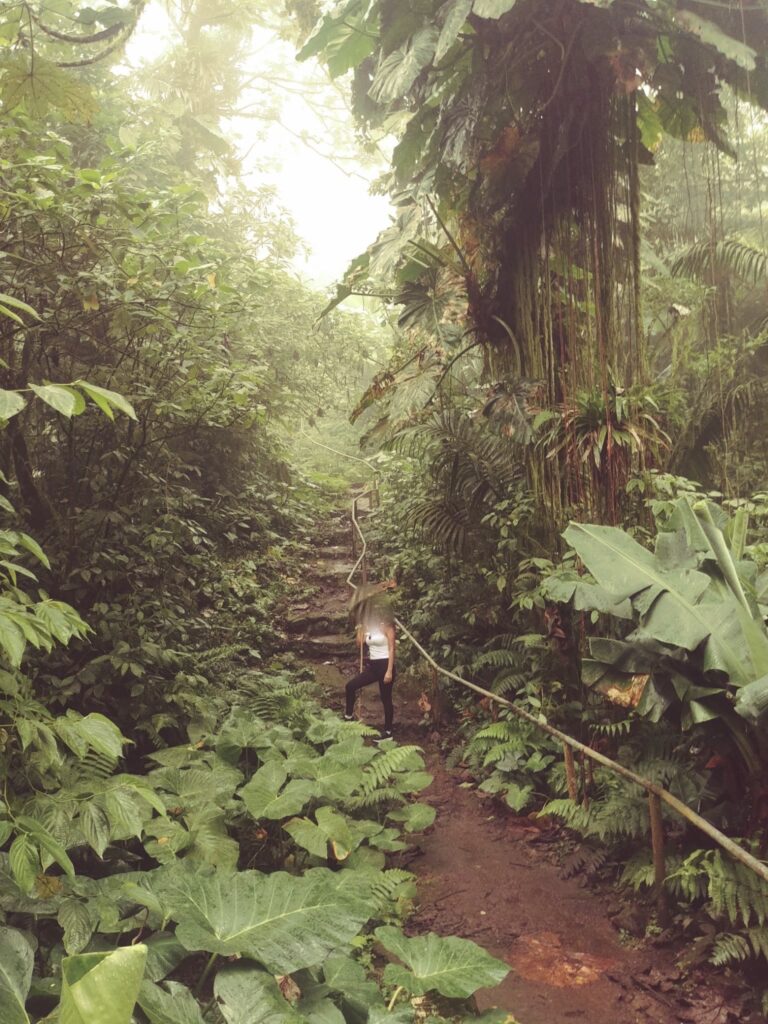
Virtually everyone on the island has a fantastic view. It holds a lot of potential with ironically many areas left to build, even if many of these will require excavation.
Wifi was not a problem anywhere. When you go into the forest you’ll like lose connection.
Banking Problem
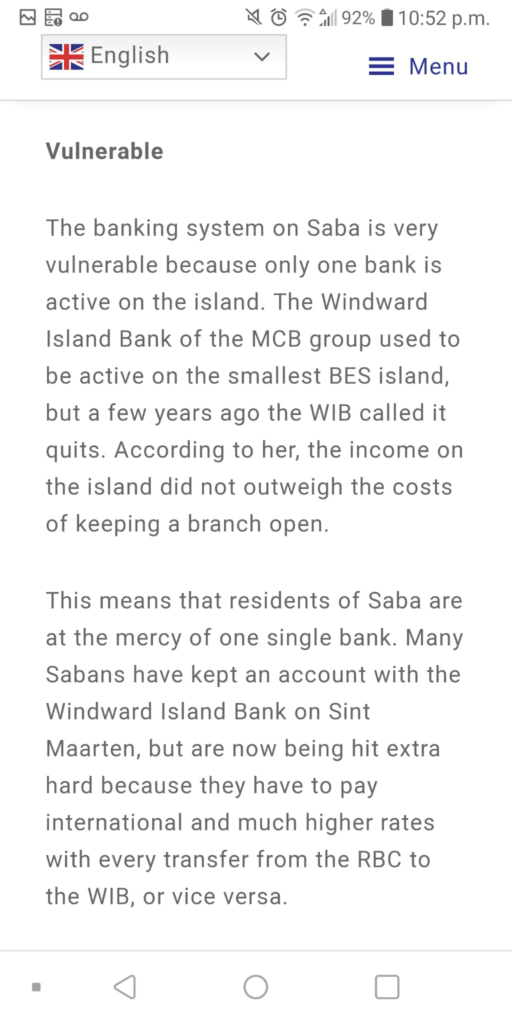

There is a real problem when it comes to banking on the island. Financial services are simply not common here and residents have normalized going to St Marten for their banking or cash withdrawals to escape the fees. Banks (similar to what I’ve written here), simply don’t see it worth it to extend out to Saba because they cannot earn enough given the small population. Its a downside that nobody wants to change.
Is there an opportunity? Find out more in our other Saba article where we post some secrets
Tax Update (Scroll down to the next photo if you don’t care about tax info)
Taxes are a lot lower than Europe & the residents we spoke to are proud of this fact
The Dutch government is responsible for the income tax, payroll tax and social security
contributions, revenue distribution tax, ABB, real estate tax, real estate transfer tax, gambling tax, excise duties & fiscal policy. The public entities may also impose local taxes, which can differ per island [in the BES].
2011 change
The Saba tax system consist of taxes on corporations and taxes on individuals. The important Saba taxes on corporations are real estate tax (vastgoedbelasting) and revenue tax (opbrengstbelasting). The revenue tax can be compared with the Dutch dividend tax. Saba does not have profits tax (winstbelasting) with it replaced by the real estate tax and the revenue tax. The real estate tax is an annual tax levied on income from some but not all immovable property. Income is not subject to the real estate tax (this is categorized as profit tax or individual income). The income is in fact established at 4% of the fair market value which is determined by official order every five years. The effective real estate tax is 0.4% for hotels and 0.8% for other real estate. A transfer tax (overdrachtsbelasting) of 5% is levied on the transfer of real estate (far lower than St Barts next door).
If real estate is subject to real estate tax, no land tax (grondbelasting) is due and the other way around. Also, exemptions of the real estate tax are applicable. One of the taxes on individuals is payroll tax (loonbelasting).
The General Expenditure Tax (Algemene Bestedingsbelasting or ABB) rate on Saba is 4% on services, such as hotel and catering services or other services provided by entrepreneurs, and 6% on the import of goods and for the supply of goods by manufacturers (I know that car imports face a hefty import tax now; a small car amounts to 8%). Gasoline is a subject to an excise duty, too.
Saba also has a social security system. The social security taxes are known as AOV, for old-age pension, and AWW, for widows and orphans. There is a contribution for both employers and employees–I am not clear on the specific amounts.
Details changing to more closely resemble the Dutch system :
- the turnover limit for participation in the Small Businesses Scheme (KOR) will increase from USD 20,000 to USD 30,000. This will make it possible for more businesses to use the KOR. You will have fewer administrative obligations.
As mentioned, the new tax system was introduced in 2011, which differs from both the previous Netherlands Antillean system and the European Dutch system. However, please note that new changes will occur in January 1st, 2024.
- Like the European Netherlands, every year the tax free allowances, thresholds and the start of the second tax band for income tax purposes are adjusted for inflation. The Caribbean Netherlands have their own compounded inflation correction. For 2024, this compounded inflation correction amounts to 7.3%, meaning all relevant amounts will be increased by 7.3%.
- AMENDED ABB RATES ON MOTOR VEHICLES Pick-ups (with a single closed cabin) and vans designed for the transportation of goods will no longer be subject to the regular ABB rate but to a higher rate per January 1st. The regular ABB rate on the Windward Islands is 6%and the higher (progressive) rate is determined by the value of the car. The progressive rate comprises of the following percentages: 10%, 18%, 22% and 30%.
- Businesses scheme will not have to pay ABB (sales tax).
- REVENUE WITHHOLDING TAX. The requirements for obtaining and maintaining a residence ruling (‘vestigingsplaatsbeschikking’)<–click the link for the specifics! This only concerns holding companies with a qualifying stake in an operational company situated in the Caribbean Netherlands that also holds an residence ruling (‘vestigingsplaatsbeschikking’).
- MANDATORY REPORTING REAL ESTATE TAX. It is mandatory for new home- and business property owners to report their new ownership of their property. In addition, if home- and business property owners do not automatically receive a tax assessment for real estate tax and should receive one, this should be reported by the home and business property owner. Failing to do so could eventually result in an administrative fine.
- INCREASE OF ANNUAL TAX FREE ALLOWANCE (INCOME TAX) TO MINIMUM WAGE. The income tax threshold will be increased from USD 17,352 to USD 20,424. Income up to the threshold will be exempt from income tax and social security contributions.
- NOTIONAL WAGE SCHEME (INCOME AND WAGE TAX) The notional wage scheme mandates that an individual holding at least 5% of the shares in a company and also performing services for that company is deemed to receive a salary that is normal for the level and duration of their work. The standard amount will be replaced by an amount that is twice as high as the income tax threshold. In 2024 this amounts to USD 40,848 (although the first 20,424 is still tax exempt).
- ABOLITION DIVIDEND EXEMPTION (INCOME TAX) The dividend exemption up to USD 5,000 in the income tax act will be abolished. When determining the taxable income in a year, income tax must be paid on all received dividends that are higher than the tax-free sum (and seniority support).
- MINIMUM TAXATION FOR MNE’S The Caribbean Netherlands does not levy profit tax for companies. However, due to international agreements a minimum tax rate of 15% of net profits is being introduced and the system will comply with the model in the Netherlands as well as the European Directive concerning a minimum rate of taxation for internationally operating companies. The measure therefore only relates to multinational groups with a worldwide turnover of € 750 million or more, and with operational activities in the Caribbean Netherlands through a subsidiary or a local branch.
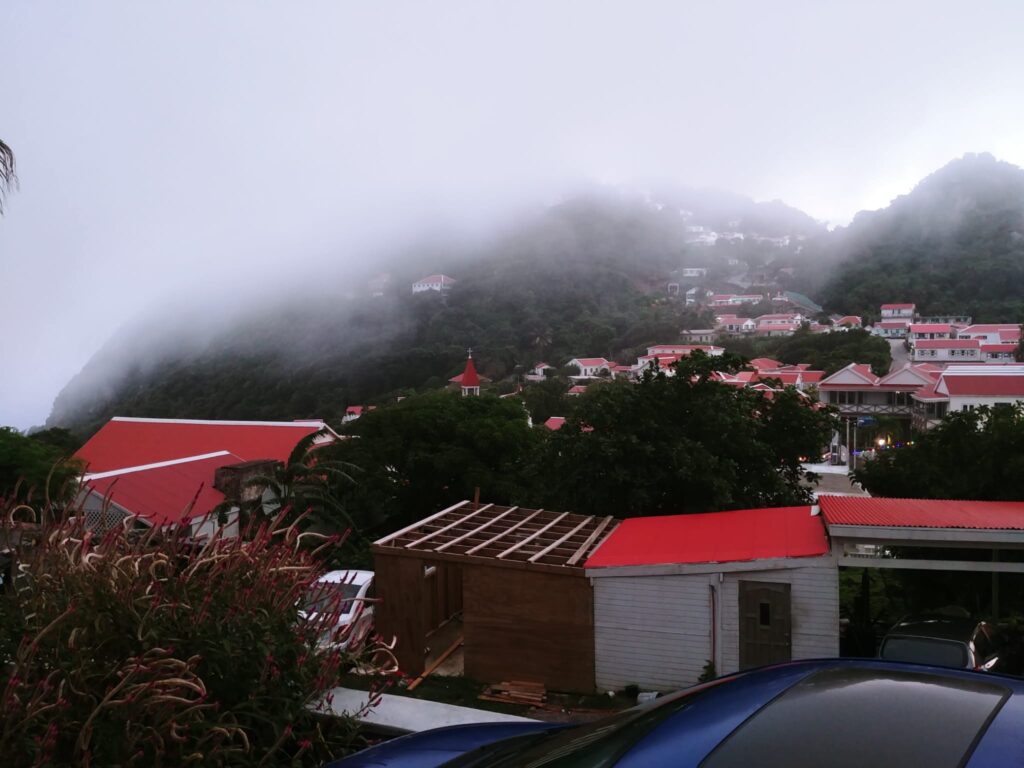
More Thoughts
To give a sense of the “vibe”, I had absolutely no idea who was “in-charge” of the place–this is not to say things were chaotic, to the contrary, they were civil between people. It never felt like there was an authority figure cramping down your throat at all times. Even the police seemed to be taking a drive more-so to kill time than look for any crime. It’s very much a live-and-let live place which is very unique in the Caribbean & Americas. In fact, we spoke to one who told of a place that never installed cameras nor bothers locking their business (knowing the type of business, if you did this in absolutely everywhere in Canada, USA or Mexico you would be out of business in 24 hours).
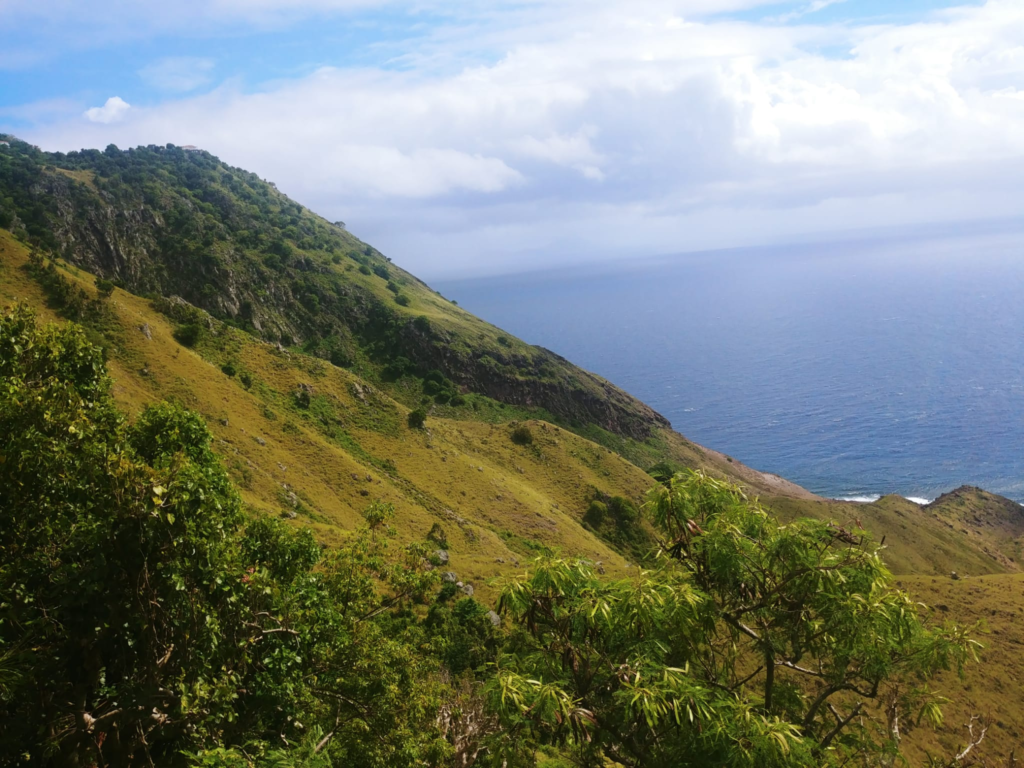
There are some explanations behind the no crime statistic.
- Obviously, due to the fact it’s so small in population, you have less hands to commit crime.
- The average person is a retiree or moved because they fell in love with the island (you don’t go to the bathroom where you eat). Additionally, folks in their 70s are less concerned about criminal behaviour as they may have been in their early 30s.
- It’s not advantageous to be a criminal here since everyone will oust you, immediately. It’s not easy to rob Peter without Paul noticing (& the rest of the island hearing about it!).
- Unless you can captain a boat on the bumpy waves in the middle of the sea, there’s no good get away (Saba has 1 road that connects the entire island). The airport & seaport are on opposing ends, both with the Dutch police present. You’d be running into a trap with very little time to get away with your crime.
- Saba has many European influences. I didn’t make up the stats but that’s how they are–European majority countries are tremendously safer than Afro-Caribbean countries–and from our experience, there were plenty of Europeans whereas visiting whereas St. Maarten & the other French islands had a lack thereof (& consequently, much higher crime and homicide rates).
- Saba lacks the luxury that may be found in St Maarten or other places throughout the seas. Less riches to be had.
It seems quite clear that with the exceptions of Bermuda and Cayman islands, Saba and St Barths are by far the safest locations in the Caribbean. In fact, if you follow our site closely you’ll be aware that we have spent time covering the Caribbean which is seeing an immense, unrelenting crime-wave taking place. The countries in the ECCB are changing before our very eyes & I believe they will resemble the failed state/failed society of Haiti in only a matter of years. Safety is precious on these islands.
People & Story
Due to the fact that it’s such a small, if you pass someone (walking) chances are they’re going to stop for a chat with you. Only 1/6th of residents were born on the island (despite them having a medical school) so they’re there for the same reasons. They’re all very willing to sit down and have a conversation with you (regardless their status). We were offered two free rides while walking on the road (which we took the 2nd one for another chat). Everybody seems to have time to have a chat–no matter what they are doing. It’s not known by many but Saba has a very low income inequality score of 0.38 GINI.
We passed a Dutch man hiking on one of the trails and he immediately struck up a conversation with us. He went so far as to give us tips and advice with hiking & to plan out our hiking itinerary. We when we said we were leaving before that many days he said “Well, when you come back, try it out”.
If Saba marketed itself as a place for young, tech-savy entrepreneurs, it would be a really interesting place. It has the weather, the soil, the activity, the internet capacity, it’s “Jewel” value could be realized… again this is for another post.
Little Story of a Day Visitor
Here’s a little story to elucidate the size of the island. We walked from Windwardside to The Bottom which is about a 45 minute, hilly walk. When we got there, we were hungry so we asked a man if he knew where restaurants were at and he apologized for not knowing where but suggested just down the hill. Minutes later, we happened to see him in the restaurant we found just down the hill. We ate and drove back to the other city in Windwardside to encounter him again in a souvenir store. We walked around the city after digesting to end up passing him again on our walk. We finally decided to head to other end of the island which we hadn’t yet seen (close to Airport) so we walked there. A long the way we saw him hanging out of a truck waving & shouted, “hello again!!”. I think this sums up the island quite well–if you lived there year round you would get quite close to those around you.
According to Wikipedia, the ethnic breakdown is as follows:
| Saban | 26.6 % |
|---|---|
| • Sint Maarten | 15.7 % |
| • American | 10.0 % |
| • other | 47.7 % |
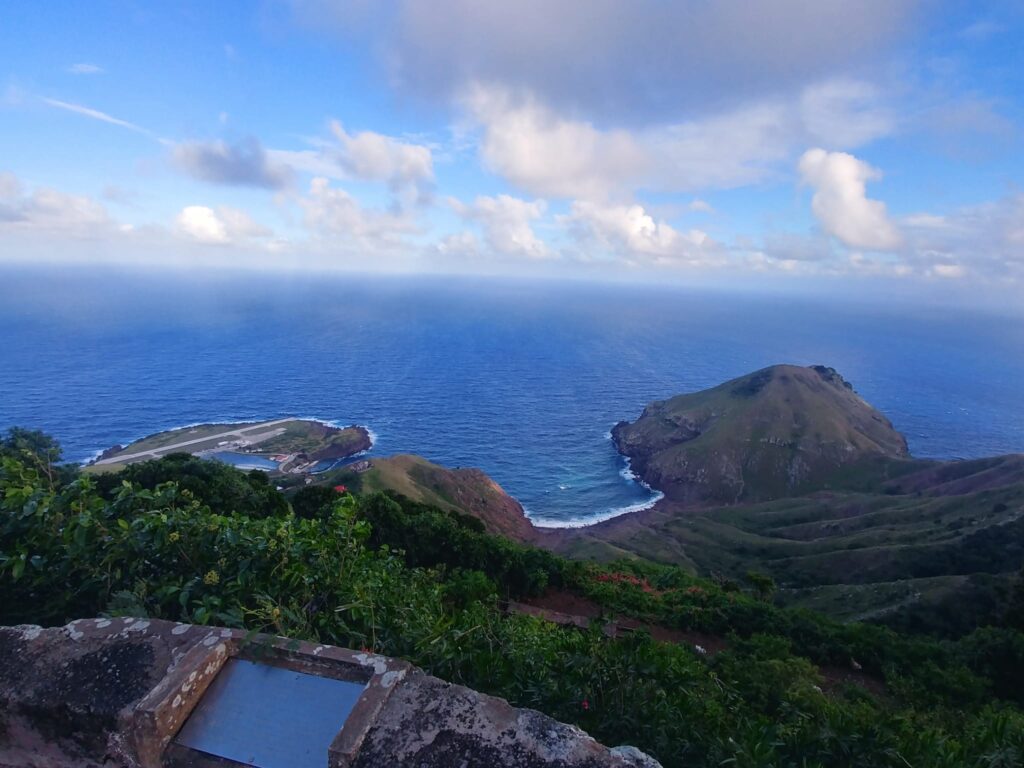
Moving
I am unclear on the details behind obtaining residency–however I was told that it’s relatively simple and that you need to show an income of approximately 22,000 USD a year & a place to live. Interestingly (if you skipped the tax section), a personal income of just over 20,000 USD is tax exempt.
It really is a small village however they think bigger. It was quite obvious after many conversations that the locals are happy about their tie to the Netherlands. They now have an income tax and reliance on the Netherlands, but the islands improvement from investment is very noticeable–it’s a tradeoff they’re happy about. In fact, the vote in 2010 to determine their future showed that approximately ~15% wanted to remain in the [former] Netherlands Antilles, a staggering ~85% wanted to become part of the Netherlands (a special municipality) and less than 1% wanted full independence. It’s quite difficult to find any movement or wanting of independence anywhere on the island as well as throughout its history, too. The take away is that when the Netherlands sneeze, Saba catches a cold.
Is there Crime at All??
We were picked up by someone who gave us a lift back to the other city (1 of the 3) who told us about a man who grabbed him by the throat once they became heated in conversation (although we have reason to believe this man lived on St. Maarten). Additionally, our landlord figured that a murder occurs once about seven years (not sure how he came up with that number).

Investment Analysis
If you want an investment breakdown of the Unspoiled Queen, we have a produced a summary of the pros and cons in our exclusive service HERE. The way I see it, the island could be in a boat load of trouble or it could be one of the best investments you’ve made in a long time/one of the best hideouts from the changing tide still left.
* ALSO There’s far more investment ideas on the exclusive service and many perks as well*
Closing
Saba is a hidden gem that not many people even know exists let alone ever get to see in their lifetime. The Dutch & the Americans are the populace who are taking most advantage of there is to do on the island & some decide to make the move. Saba is perhaps the safest place in the entire region (or technically in all of Europe right now).
The island is small, but it does offer fertile volcanic soil for small farming, a surprising number of hikes & privacy. The taxes are something I’ll have to really sit down to consider but as far as I can tell they’re a very large bargain compared to 90% of Europeans, without the tensions that exist on the continent right now.
However, with all the attractive features it has going for it–it is heavily dependent on others to sustain their way of life. Banking, imports, economic planning & prices are largely determined hundreds of miles away which causes a level of uncertainty for locals (although, locals don’t wish to be independent). I strongly question how Saba would fair if the St Maarten ships stopped showing up next week. In the meantime, the people are very friendly & criminal behaviour is truly rare.
It’s retiree + “leave me be” population is less about innovation & entrepreneurship and more about tranquility & off-the-grid private life. In either situation, Saba has the capacity to become either a nomad hub for new entrepreneurs or a wealthy haven for high-net worth individuals looking to escape–IF of course, it can survive the current global depression & potentially, World War 3 since the Netherlands will undoubtedly be involved.
I hope you enjoyed our breakdown, experience and my ideas of this cute island. We’ll be back! Don’t forget to subscribe to find out if Saba is your next place of opportunity that few people know about!
#StayOnTheBall
